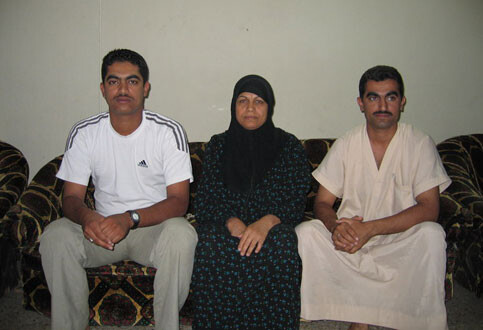IRIN 16 December 2006

Palestinian refugees in Iraq face daily death threats to leave the country, but have nowhere to go. (Afif Sarhan/IRIN)
BAGHDAD — Palestinian refugees living in Iraq say there is increasing fear in their community after a recent attack on a predominantly Palestinian Baghdad neighbourhood left nine people dead and several injured, including children.
“We are getting worried about our situation in Iraq. We cannot leave the country because the borders are closed to us and the government doesn’t give us any hope that it can increase our security,” said Ahmed Muffitlak, spokesman for the Baghdad-based Palestinian Muslims Association (PMA).
On 13 December, local militia attacked the al-Baladiya district of the capital, where hundreds of Palestinians have lived for years. No attempt was made by the Iraqi police or multinational forces to halt the three-hour attack, Muffitlak said, adding that the militia stopped ambulances entering the area and attacked anyone who tried to enter or leave without their authorisation.
“Many elderly people got seriously sick just from the tension [of the situation] and some children were injured. When a father tried to take his six-year-old son to hospital, the fighters killed him, leaving the child in the street bleeding,” Muffitlak said.
The UN refugee agency (UNHCR) said it was appalled by this violent attack by armed militia and appealed to the international community to provide a solution for Palestinians attempting to flee Iraq.
“We are very alarmed by this attack and dismayed by the lack of protection given to Palestinians in Iraq. They have very limited freedom of movement and no possibility to leave the country - unlike Iraqis - to find a safe haven, nor any community to protect them,” Radhouane Nouicer, UNHCR’s Geneva-based deputy director for the region, said in a statement on 14 December.
Urgent protection needed
“We are urgently appealing to the Iraqi government and the multinational forces to provide protection and safety or an alternative safe location for this targeted group. We also ask the world to stop turning their back and provide a humane solution and safe haven to these people who have no way out,” Nouicer added.
The Iraqi government has responded by saying that violence in the country is not only directed towards Palestinians but to everyone living in Iraq.
“We are really worried about the safety not only for Palestinians but also for all Iraqis and foreigners in our country and we are working hard to catch all these groups that are taking the lives of hundreds of innocent people,” Lt Col Saeed Abdel-Fatah, a Ministry of Interior officer, said.
IRIN contacted a spokeswoman for the Multinational Forces in Iraq on the subject of the safety of Palestinians living there but has received no response as yet.
Palestinians in Iraq have lived under a degree of fear since the US-led occupation of Iraq began in 2003. As Sunnis under Israeli occupation in their homeland, they were afforded privileged status under former president Saddam Hussein’s government - a factor which is now pitting them against the formally marginalised Shi’ite community in Iraq.
But ever since Sunni militants attacked a Shi’ite shrine in the northern city of Samarra in February this year, Palestinians have been increasingly targeted as sectarian violence between Sunni and Shi’ite Muslims escalated.
Dozens of cases of the kidnappings and killings of Palestinians have been reported by UNHCR and local NGOs in the past few months.
“We have received reports of more than 500 threats against Palestinians and many cases of murders as well as women and youths being raped,” Muffitlak said, adding that leaflets with death threats were left outside doors in Palestinian neighbourhoods of Baghdad, prompting hundreds to flee to the Syria-Iraq border.
Muffitlak said that most embassies in the country have stopped taking documents from Palestinians trying to arrange foreign visas. “We have called the UNHCR for help in taking every Palestinian out of Iraq before they get killed. But the organisation said that it is having great difficulty getting authorisation from foreign and Arab countries,” he said.
UNHCR said it has approached resettlement countries, but so far positive responses have only been forthcoming from Canada, which has taken 64 Palestinians who were stranded in a Jordanian refugee camp for years. Syria took in 287 Palestinians in May 2006, before closing its borders to other desperate Palestinians, according to the latest UNHCR press release.
In 2003, UNHCR registered 23,000 of an estimated 34,000 Palestinians living in Iraq in 2003. Today, less than 15,000 Palestinians are believed to remain in the country.
This item comes to you via IRIN, a UN humanitarian news and information service, but may not necessarily reflect the views of the United Nations or its agencies. All IRIN material may be reposted or reprinted free-of-charge; refer to the copyright page for conditions of use. IRIN is a project of the UN Office for the Coordination of Humanitarian Affairs.
Related Links